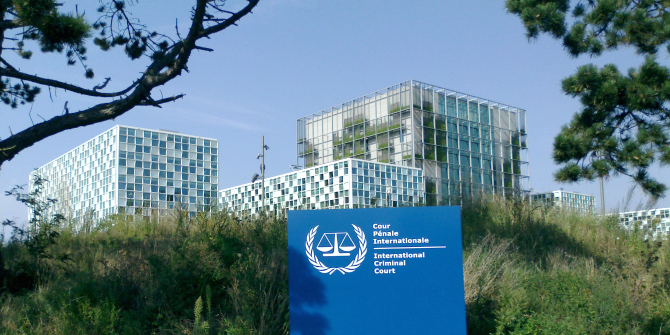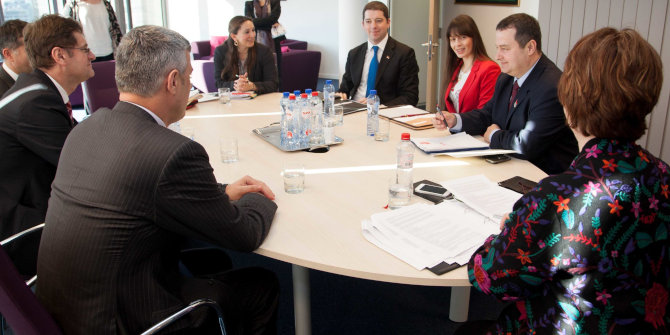The fall of Afghanistan to the Taliban has raised fears in both the EU and Turkey of a new refugee crisis emerging. Luigi Scazzieri writes that the situation is likely to lead to ever more transactional EU-Turkey ties, with both sides pushed to work together to manage migration, but without a broader improvement in their relations.
The Taliban’s seizure of power in Afghanistan has already pushed many Afghans to flee the country. It is likely that more will seek to leave in the coming months, especially if Afghanistan’s economy deteriorates and the Taliban become even more oppressive. Many Afghans will remain in the immediate region, especially in Pakistan and Iran, which are already hosting 1.5 million and 800,000 Afghan refugees respectively. Other Afghans will try to make their way through Iran to Turkey, which is already hosting 100,000 Afghan refugees, and from there to Europe. This will push the EU and Turkey to work together, but co-operation is unlikely to be smooth or to prompt a broader EU-Turkey rapprochement.
Migration has stood out as one of the few areas of EU-Turkey co-operation over the past few years, even as the broader EU-Turkey relationship deteriorated. In March 2016, at the height of the migration crisis, the EU and Turkey struck a deal: in exchange for Turkish co-operation in controlling migration, the EU provided Turkey with €6 billion in funding to help support the almost three million Syrian refugees Ankara was then hosting. European leaders also promised to revive Turkey’s EU accession negotiations, increase Turkey’s access to the single market by upgrading the EU-Turkey customs union, and grant Turkish citizens visa free travel to the EU.
Most of this agenda did not progress as a result of European concerns about the rising authoritarianism of the Erdoğan government, Ankara’s naval operations near Greece and Cyprus, and its military interventions in Libya and Syria. Even the purely migration-related component of the deal never functioned as originally intended, with few migrants returned from Greece to Turkey. But EU support for refugees in Turkey continued, and in June 2021 EU leaders agreed to give Turkey more funding to support refugees. Although the details still have to be fully agreed, this is a recognition of the fact that Turkey hosts the largest refugee population in the world and needs European support.
The EU and Turkey share common interests in relation to the arrival of Afghan migrants and refugees. European leaders want to prevent Afghans from reaching Europe, fearful that large numbers of refugees might further strengthen anti-migrant populism. Turkey also does not want more migrants on its territory. Over the past few years, the presence of millions of refugees in Turkey has become a big problem for Erdoğan and caused a backlash that has seen anti-migrant riots on Turkey’s streets.
Turkey’s opposition has extensively criticised the government for its handling of migration, with the main opposition party saying it would send Syrian and Afghan refugees back. The government can ill afford an influx of Afghans and new criticism at a time when it is coming under attack for its handling of the economy and its response to wildfires this summer. Erdoğan has pledged to put a “complete stop” to migrant crossings, and Ankara is building a wall along part of its border with Iran to strengthen its borders.
The EU and Turkey will be pushed to work together to manage migration from Afghanistan. The EU has already discussed plans to provide financial support to help Turkey to police its border, to prevent migrants from entering. The EU is also likely to provide Turkey with funds to support refugees, in addition to those that leaders already agreed to give Turkey. But co-operation will be tense. European leaders can expect Ankara to dial up the rhetoric and to occasionally push migrants towards the EU, both to drum up domestic political support and to remind the EU of its leverage. The greater the number of Afghans that enter Turkey, the more Ankara is likely to pressure the EU and to criticise Europeans for not helping enough.
Nevertheless, Ankara is likely to find that its ability to pressure Europe is not as great as it was, and that it is in its interest to try to work with the EU. The EU has reinforced its border with Turkey, while Greece has shown it is willing to stop migrants even if this means resorting to the use of force to push them back. Nevertheless, even pushbacks may not work if the number of people trying to enter Europe greatly increases – which poses a strong incentive for Europe to try to work with Turkey. All this means that, while the EU and Turkey are likely to occasionally clash over migration, their mutual interest in co-operation is likely to prevail.
The broader question is whether the common interest in managing migration from Afghanistan will prompt a broader EU-Turkey rapprochement. This seems unlikely. Over the past few years, co-operation on migration has not prevented other disagreements from escalating. And none of the other areas of disagreement seem likely to improve soon. The state of the rule of law in Turkey shows no sign of improving and will continue to make member states reluctant to unblock accession negotiations or to grant Turkish citizens visa free travel.
In theory, the domestic political situation in Turkey need not block a planned upgrade of the EU-Turkey customs union as EU leaders are no longer insisting that the upgrade depends on Ankara improving human rights and the rule of law. However, Turkey’s continued push for a two-state solution on the island of Cyprus is fuelling tensions with Cyprus and other EU states. This makes it unlikely that member states will agree to proceed.
EU-Turkey co-operation in managing rising numbers of Afghan refugees and migrants will reinforce the trend towards ever more transactional EU-Turkey ties. Turkey and the EU will be pushed to work together, but this is unlikely to lead to a broader improvement in relations. There will inevitably be tensions over migration itself, particularly if the number of Afghans arriving is high. At the same time, disagreements over other issues, ranging from Turkey’s domestic political situation to Ankara’s push for a two-state solution in Cyprus, will continue to cause friction and to pose a formidable obstacle to a broader improvement in relations.
Note: This article gives the views of the author, not the position of EUROPP – European Politics and Policy or the London School of Economics. Featured image credit: European Council




